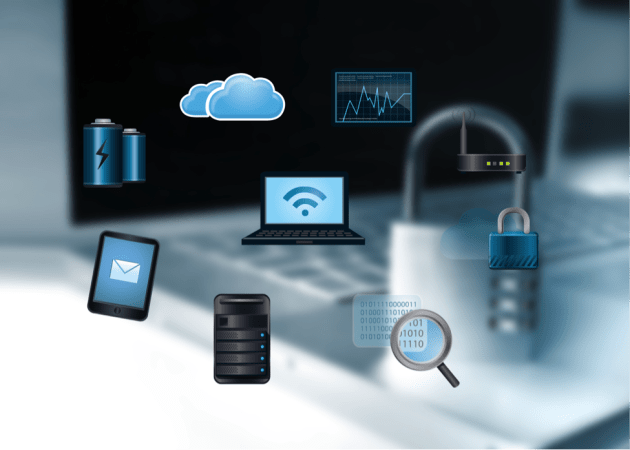These days it’s incredibly common for a person to have at least a cell phone, computer, and tablet. Many people have a home desktop computer as well as a laptop even, and even little kids run around with their own iPhones (I know, let’s not get into that one).

With a gadget for every scenario, we take our business and personal lives on the go with us everywhere. Airports have long since outfitted their chairs with charging ports, and Wi-Fi hotspots are as common as gas stations. We’re all connected, all the time, managing our finances, keeping tight schedules, even working through cloud computing.
Improve The Security Of Your Mobile Devices
The level of connectivity is astounding, and the applications keep growing. With apps to manage your thermostat at home, and watches that track your exercise, the world has evolved into a realm of convenience that previous generations likely never thought possible.
The Catch
Like everything else though, all of that connectivity and advancement comes with a catch. Security has become the biggest issue of them all, as criminals take advantage of people’s lackadaisical attitudes with their personal information.
It’s so easy to sync your contacts, login to PayPal, and shop online, that most people never stop to think about who could be watching. On public networks, the risk of having your personal information stolen is even higher, and as a result identity theft numbers have continued to skyrocket.
In addition, as the mobile networks have opened up, government agencies have taken notice, and have seized the opportunity to ramp up surveillance efforts. It may be ‘for your own protection’, but it still gives me the creeps.
There are plenty of things you can do to combat the issues surrounding public Wi-Fi usage and mobile device security, but it takes diligence, and a little bit of effort on your part. I’ll show you a few simple ways you can ramp up your security, so you can maintain that convenience of using those devices, without compromising your privacy.
Avoid Public Networks
I know, I know. Seriously, who doesn’t use public Wi-Fi? It’s everywhere, and it’s usually free. We’ve all camped out in a Panera Bread parking lot once or twice just to get online, let’s be honest. But public networks are like the public parks of the online world – you just never know who’s lurking around. Whenever possible, try to avoid using them at all.
Check Out Your Security Settings
Yea, like you’re just going to stop using public Wi-Fi. That’s fine, but let’s be smart about it. For starters, check out the security settings on all of your devices. Most people never even bother to see what their sharing settings are set to, and a lot of times they leave them wide open to infiltration.
Make sure Network Discovery is off, as this setting allows other users on the network to see that you’re there, and basically offers you up on a silver platter as a target. While sharing may be caring, on a public network, it’s just asking for trouble. Turn off file sharing, printer sharing, all of it. Take a look at the security on your device and make sure your Firewall is up and running while you’re at it.
Only Visit Secure Sites
If you’re online shopping or just killing some time on Pinterest, make sure you’re only visiting secure websites. Websites that begin with https or have a little padlock next to their URL actually encrypt your information on the way to their servers, so they’re much more secure than others. At the very least, never enter personal or payment information on an unsecure site.
Be Aware of the People Around You
Shoulder surfing is when people nearby literally look over your shoulder to see if they can swipe login information or credit card numbers from you. It may seem like a primitive way to hack a connection, but it’s incredibly easy to act like you’re looking nonchalantly at your phone when you’re actually recording someone accessing an account. Get a private quiet corner, and make sure you don’t have anyone spying on you.
Use a VPN
Finally, the most comprehensive way to up your security on all of your mobile devices is definitely by using a VPN. VPNs, or virtual private networks, are encrypted tunnels in the internet, provided by a host company, that keep your connection secure and private. They route you to one of their secure servers, of which you can actually choose the location.
VPN providers usually have servers all over the world, so you can even use them to access blocked content if you’re in a country with strict internet censorship. Your IP address is blocked, so not only is your access totally open, but your connection is private and totally anonymous – not even big brother government can see what you’re up to. There are many VPN providers out there, so you should do your research to see which VPN would be best for your iPhone.
When it comes right down to it, none of these security measures require a great deal of effort. Take five minutes out of your day to go over those security settings, and see if you have it in your budget to sign up for a VPN. Try to avoid public networks, and when you can’t, be wary of other users on the same network.
With a little foresight and common sense, you can have your cake and eat it too, enjoying all of the advancements and convenience that mobile internet has to offer, without compromising your privacy or security.